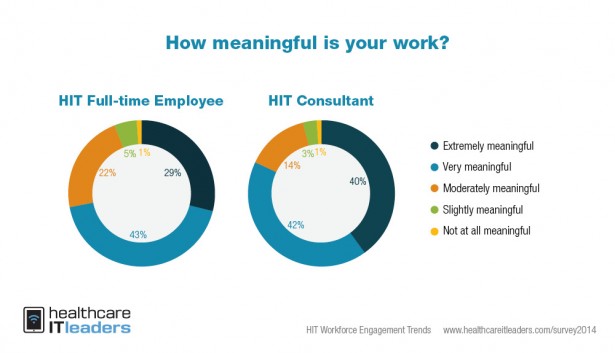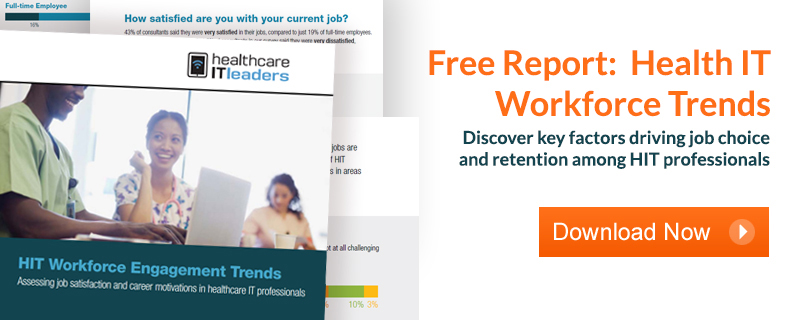Is Healthcare IT Meaningful Work?
Most would agree that doctors and nurses, i.e., those on the front lines of delivering patient care, have meaningful jobs.
But what about those behind the scenes, such as the healthcare IT workforce that installs the electronic medical records systems (EMRs), maintains billing and coding software and manages the overall IT infrastructure of hospitals and health systems? Do they view their work as meaningful?
We asked full-time healthcare IT employees and consultants that question in our 2014 HIT Workforce Engagement survey. In it, 78% told us that they find their work “extremely meaningful” or “very meaningful.” Only 1% of respondents said their work was “not at all meaningful.”
Breaking down the results further, while both groups positively associate their jobs with meaning, consultants are more likely than FTEs to rate their work as “extremely meaningful.”
Our report also found that meaning correlated strongly to job satisfaction. Among healthcare IT workers (FTEs and consultants) that rated their work as “extremely meaningful” or “very meaningful,” 89% were also “extremely satisfied” with their jobs.
Why Meaning Matters
Why should organizations care if their workers find their jobs meaningful? For starters, the correlation between meaning and job satisfaction can improve retention. Additionally, research shows that finding meaning in one's work can increase motivation, engagement, empowerment, career development, individual performance and personal fulfillment, while reducing absenteeism and stress.
What makes a job meaningful? As you might suspect, jobs that positively impact the lives of others (e.g. physician, firefighter) often rank as highly meaningful. But helping others isn’t the only path to meaning.
Author Roman Krznaric, in his book, “How to Find Fulfilling Work,” suggested five dimensions of meaning that effect one’s opinion of their job:
- Earning money
- Achieving status
- Making a difference
- Following your passions (interests)
- Using your talents (skills)
For employers that want to reap the benefits of engaged employees, the list above suggests multiple opportunities. Offering individual recognition, financial and otherwise, will enhance meaning for some, while creating volunteer opportunities for employees or providing additional training, will be valued by others.
For healthcare workers specifically, some research suggests that increasing connection to the ultimate beneficiaries of their work — patients — may positively affect engagement.
In his book, “Give and Take,” author Adam Grant mentions research with radiologists, who typically have no patient interaction, that simply attaching a patient’s photo to an X-ray yields 12% increases in the length of their reports and 46% improvements in diagnostic findings.
Grant’s book also highlights medical device maker Medtronic’s practice of inviting patients to its annual holiday party to tell stories of how the company’s products have positively changed their lives. Meeting patients in person helps engineers and other Medtronic employees feel a deeper connection to their work.
Learn more about the Healthcare IT Workforce in our new report.

